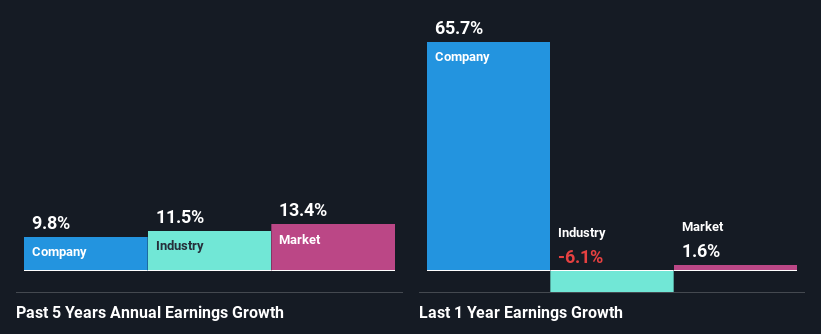- South Korea
- /
- Semiconductors
- /
- KOSDAQ:A425420
Could The Market Be Wrong About Tfe Inc. (KOSDAQ:425420) Given Its Attractive Financial Prospects?

Tfe (KOSDAQ:425420) has had a rough three months with its share price down 37%. However, stock prices are usually driven by a company’s financial performance over the long term, which in this case looks quite promising. In this article, we decided to focus on Tfe's ROE.
Return on equity or ROE is a key measure used to assess how efficiently a company's management is utilizing the company's capital. In other words, it is a profitability ratio which measures the rate of return on the capital provided by the company's shareholders.
View our latest analysis for Tfe
How Is ROE Calculated?
The formula for return on equity is:
Return on Equity = Net Profit (from continuing operations) ÷ Shareholders' Equity
So, based on the above formula, the ROE for Tfe is:
11% = ₩9.2b ÷ ₩83b (Based on the trailing twelve months to June 2024).
The 'return' is the amount earned after tax over the last twelve months. So, this means that for every ₩1 of its shareholder's investments, the company generates a profit of ₩0.11.
Why Is ROE Important For Earnings Growth?
We have already established that ROE serves as an efficient profit-generating gauge for a company's future earnings. We now need to evaluate how much profit the company reinvests or "retains" for future growth which then gives us an idea about the growth potential of the company. Assuming all else is equal, companies that have both a higher return on equity and higher profit retention are usually the ones that have a higher growth rate when compared to companies that don't have the same features.
Tfe's Earnings Growth And 11% ROE
To begin with, Tfe seems to have a respectable ROE. Especially when compared to the industry average of 6.7% the company's ROE looks pretty impressive. This certainly adds some context to Tfe's decent 9.8% net income growth seen over the past five years.
We then performed a comparison between Tfe's net income growth with the industry, which revealed that the company's growth is similar to the average industry growth of 11% in the same 5-year period.

Earnings growth is an important metric to consider when valuing a stock. What investors need to determine next is if the expected earnings growth, or the lack of it, is already built into the share price. This then helps them determine if the stock is placed for a bright or bleak future. Is Tfe fairly valued compared to other companies? These 3 valuation measures might help you decide.
Is Tfe Using Its Retained Earnings Effectively?
Tfe doesn't pay any regular dividends currently which essentially means that it has been reinvesting all of its profits into the business. This definitely contributes to the decent earnings growth number that we discussed above.
Conclusion
Overall, we are quite pleased with Tfe's performance. Particularly, we like that the company is reinvesting heavily into its business, and at a high rate of return. Unsurprisingly, this has led to an impressive earnings growth. If the company continues to grow its earnings the way it has, that could have a positive impact on its share price given how earnings per share influence long-term share prices. Not to forget, share price outcomes are also dependent on the potential risks a company may face. So it is important for investors to be aware of the risks involved in the business. To know the 2 risks we have identified for Tfe visit our risks dashboard for free.
Valuation is complex, but we're here to simplify it.
Discover if Tfe might be undervalued or overvalued with our detailed analysis, featuring fair value estimates, potential risks, dividends, insider trades, and its financial condition.
Access Free AnalysisHave feedback on this article? Concerned about the content? Get in touch with us directly. Alternatively, email editorial-team (at) simplywallst.com.
This article by Simply Wall St is general in nature. We provide commentary based on historical data and analyst forecasts only using an unbiased methodology and our articles are not intended to be financial advice. It does not constitute a recommendation to buy or sell any stock, and does not take account of your objectives, or your financial situation. We aim to bring you long-term focused analysis driven by fundamental data. Note that our analysis may not factor in the latest price-sensitive company announcements or qualitative material. Simply Wall St has no position in any stocks mentioned.
About KOSDAQ:A425420
Tfe
Engages in the manufacture and sale of semiconductor IC testing equipment in South Korea and internationally.
Excellent balance sheet low.
Similar Companies
Market Insights
Community Narratives



